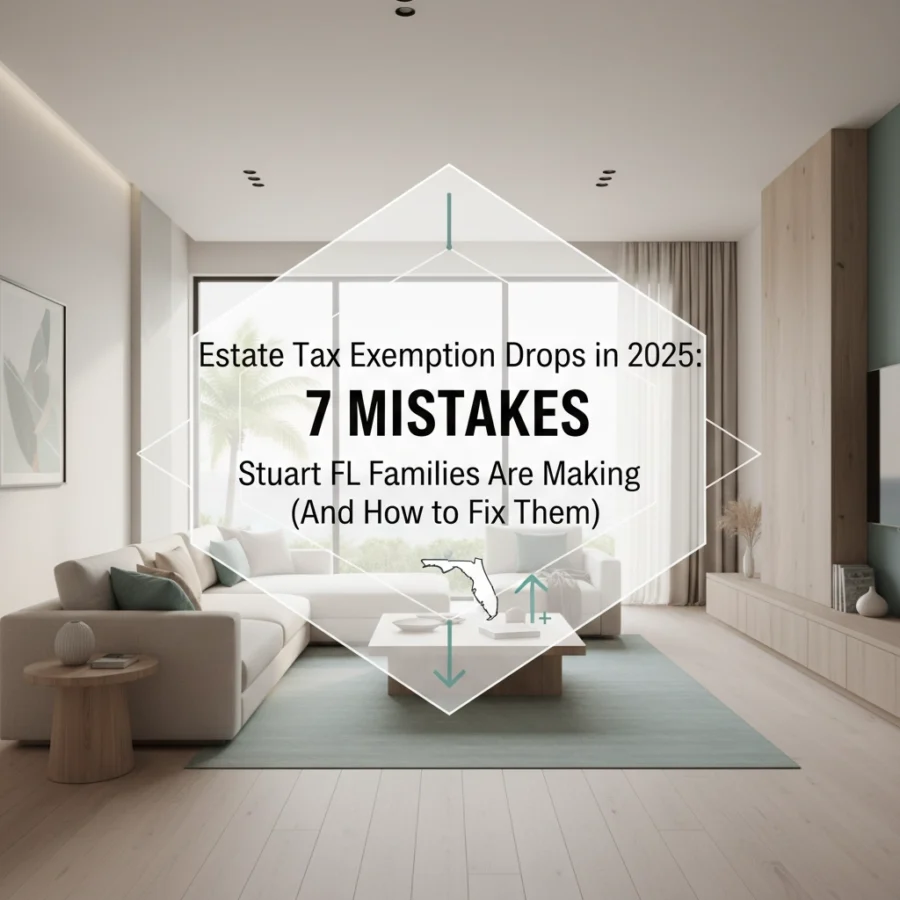If you’re a Stuart family with substantial assets, you’re probably breathing a sigh of relief right about now. The feared estate tax exemption cliff that was supposed to hit at the end of 2025 has been averted thanks to Congress passing the One Big Beautiful Bill Act in August. Starting January 1, 2026, the federal estate tax exemption jumps from this year’s $13.99 million per person to a permanent $15 million per person: or $30 million for married couples.
But here’s the thing: just because we dodged that particular bullet doesn’t mean Florida families are in the clear. In my years working with affluent families in Stuart and across the Treasure Coast, I’ve seen the same costly mistakes repeated over and over again. These errors can cost families hundreds of thousands: sometimes millions: in unnecessary taxes, legal fees, and family conflict.
Let’s dive into the seven most common estate planning mistakes I’m seeing right here in Stuart, and more importantly, how to fix them before they derail your family’s financial future.
Mistake #1: Outdated Beneficiary Designations on Retirement Accounts
This one’s a doozy, and it happens more often than you’d think. Your 401(k), IRA, and life insurance policies all have beneficiary designations that override whatever you’ve written in your will. I’ve seen families where Dad updated his will after divorcing his first wife and marrying his second, but never changed the beneficiary on his $2 million IRA. Guess who gets that money when he passes? Yep: the ex-wife.
The Fix: Pull out every retirement account statement, life insurance policy, and annuity you own. Check the beneficiaries listed. Are they current? Are the contingent beneficiaries still alive and appropriate? Make it a habit to review these annually, especially after major life events like marriage, divorce, births, or deaths in the family.

Mistake #2: Using Out-of-State Estate Planning Documents
Florida has some of the most favorable estate planning and asset protection laws in the country, but those benefits only work if your documents are properly crafted under Florida law. I regularly see families who moved here from New York, Connecticut, or New Jersey but are still using estate planning documents created in those states.
Here’s why that’s problematic: Florida doesn’t recognize all the same trust structures, has different homestead rules, and has unique requirements for document execution. That fancy revocable trust you set up in Manhattan? It might not hold up in a Florida probate court.
The Fix: When you become a Florida resident, have your estate planning documents reviewed by a Florida-licensed attorney who understands the nuances of state law. Don’t just update your address: ensure the entire structure complies with Florida requirements and maximizes the state’s protective benefits.
Mistake #3: Ignoring Florida’s Unique Homestead Laws
Florida’s homestead exemption is one of the best asset protection tools available, but it’s also one of the most misunderstood. Your primary residence can be protected from creditors regardless of value: we’re talking about a $5 million beachfront home getting the same protection as a $300,000 ranch house. But there’s a catch: the property has to be properly classified as homestead, and there are specific rules about how it can be transferred.
I’ve seen families lose this protection by adding children’s names to the deed or by setting up the wrong type of trust ownership. Others have inadvertently created tax nightmares by not understanding how homestead property passes to surviving spouses versus children.
The Fix: Review your homestead property’s title and ensure it’s properly designated for homestead tax and creditor protection benefits. If you’re married, understand how Florida’s homestead rules will affect your surviving spouse’s rights. For business owners especially, proper homestead planning can be the difference between protecting your family home and losing it to business creditors.
Mistake #4: Failing to Properly Title Assets
Asset titling might sound boring, but it’s the foundation that holds your entire estate plan together. I’ve seen beautifully crafted trusts that became worthless because the family never actually transferred their assets into them. The $3 million investment account is still in Dad’s individual name. The rental properties are owned jointly with rights of survivorship instead of by the trust. The business interests have never been formally transferred.
When assets aren’t properly titled, they don’t follow your estate plan: they follow state law. In Florida, that often means unnecessary probate, which is public, time-consuming, and expensive.
The Fix: Work with your estate planning attorney and financial advisor to ensure all significant assets are titled correctly. If you have a trust, your assets generally need to be formally transferred into that trust. Investment accounts, real estate, business interests, and even personal property like boats or artwork may need retitling.
Mistake #5: Not Planning for Florida’s Lack of State Estate Tax
Here’s some good news: Florida has no state estate tax. But this creates a different kind of planning mistake. Many families assume that because Florida doesn’t have a state estate tax, they don’t need sophisticated estate planning. They’re wrong.
While you won’t pay state estate tax in Florida, you’ll still owe federal estate tax if your estate exceeds the exemption amounts. Plus, Florida families often have property in other states: a summer home in North Carolina, a ski condo in Colorado, or investment property in Georgia. Those states might have their own estate tax rules that could catch you off guard.
The Fix: Don’t let Florida’s favorable tax environment make you complacent. If your total estate approaches the federal exemption limits, you still need proper planning. If you own property in multiple states, understand each state’s tax implications and consider strategies to minimize your overall exposure.

Mistake #6: Inadequate Business Succession Planning
Stuart is home to many successful business owners, from marine industry entrepreneurs to real estate developers to professional service providers. Yet most of these business owners haven’t properly planned for what happens to their business when they’re no longer able to run it.
Without proper succession planning, your business might be forced into a fire sale, leaving your family with a fraction of its true value. Even worse, the IRS might value your business interest at its full fair market value for estate tax purposes while your family receives much less in the actual sale.
The Fix: Start business succession planning early, ideally while you’re still actively involved and the business is performing well. Consider strategies like management buyouts, family succession plans, or employee stock ownership plans (ESOPs). For larger businesses, sophisticated techniques like grantor retained annuity trusts (GRATs) or installment sales to intentionally defective grantor trusts can help transfer business value at reduced gift and estate tax costs.
Mistake #7: Procrastination and Perfectionism Paralysis
This last mistake might be the most costly of all: waiting for the “perfect” time to get your estate plan in place or updated. I hear it constantly: “We’ll get to it next month,” or “Let’s wait until the kids finish college,” or “We want to see what happens with the election first.”
Here’s the hard truth: there’s never a perfect time, and waiting often means your family will face unnecessary complications when you can least afford them. The best estate plan is the one that’s actually in place when you need it.
The Fix: Stop waiting and start planning. Estate planning is not a one-and-done event: it’s an ongoing process that should evolve with your life circumstances. Set a deadline for getting your basic documents in place, then commit to reviewing and updating them regularly.
Taking Action: Your Next Steps
The new permanent $15 million federal exemption gives Florida families more planning flexibility, but it doesn’t eliminate the need for proper estate planning. Whether you’re dealing with one of these seven mistakes or just want to ensure your plan is optimized for your family’s unique situation, the key is taking action now rather than later.
At Davies Wealth Management, we’ve helped hundreds of Stuart families navigate these complexities and create comprehensive estate plans that protect their wealth and their families. We understand the intersection of Florida law, federal tax requirements, and practical family dynamics that make each situation unique.
Ready to get your estate plan on solid ground? Our estate planning process starts with understanding your specific situation, goals, and concerns. From there, we’ll work with you and your legal team to create a plan that addresses these common mistakes while positioning your family for long-term success.
Get started with our comprehensive estate planning assessment and take the first step toward protecting what matters most to your family.
Don’t let these preventable mistakes cost your family their financial security. The peace of mind that comes from proper estate planning is worth far more than the cost of getting it right.



Leave a Reply